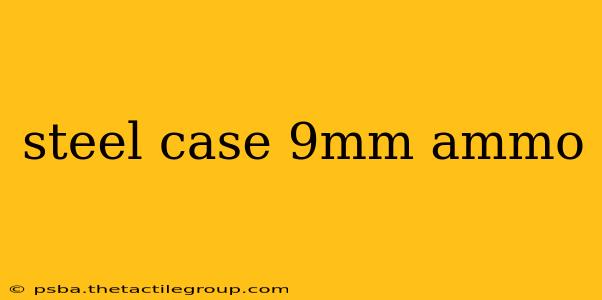Finding the right ammunition can be a daunting task, especially with the sheer volume of choices available. This guide dives deep into the world of steel case 9mm ammo, exploring its pros, cons, and suitability for various shooting applications. Whether you're a seasoned shooter or just starting out, understanding the nuances of steel case ammo is crucial for making informed purchasing decisions.
What is Steel Case Ammo?
Steel case ammunition, as the name suggests, utilizes steel, rather than brass, for its cartridge casing. This difference in material significantly impacts cost, performance, and overall suitability for different firearms and shooting disciplines. The steel casing is often coated with a polymer to prevent corrosion and improve feeding reliability.
Advantages of Steel Case 9mm Ammo:
-
Cost-Effectiveness: This is arguably the biggest draw. Steel is significantly cheaper than brass, resulting in a lower price per round, making it an attractive option for high-volume shooting practices.
-
High Availability: Steel case 9mm is widely available, particularly from various online retailers and sporting goods stores. This accessibility makes it convenient for shooters who require a large quantity of ammunition.
Disadvantages of Steel Case 9mm Ammo:
-
Potential for Increased Wear and Tear: The steel casing can be harder on firearm components, potentially leading to increased wear and tear, particularly on the feed ramp and extractor. This is a significant consideration for shooters with high-end or particularly sensitive firearms.
-
Reduced Accuracy in Some Firearms: While many firearms handle steel case ammo without issue, some can experience reduced accuracy due to the harder casing. This variability depends on the specific firearm and its tolerances.
-
Not Recommended for Certain Firearms: Some firearm manufacturers explicitly caution against the use of steel case ammunition, citing potential damage to the firearm. Always consult your firearm's manual before using steel case ammo.
-
Potential for Less Reliable Function: Although polymer coatings mitigate this, some shooters report higher rates of malfunctions such as feeding issues or stovepipes with steel case ammunition compared to brass.
-
Environmental Concerns: The steel casing is not easily recyclable in the same way brass is, raising environmental concerns about its disposal.
When is Steel Case 9mm Ammo Appropriate?
Steel case 9mm ammunition shines in specific situations:
-
Practice and Training: Its affordability makes it ideal for practicing and improving shooting skills, particularly for high-volume drills and training exercises.
-
Casual Shooting: For recreational shooting at the range where cost is a primary concern, steel case 9mm is a viable and economical choice.
When to Avoid Steel Case 9mm Ammo:
-
High-End Firearms: Avoid using steel case ammo in expensive or high-performance firearms to minimize the risk of damage to sensitive components.
-
Competitions: Many shooting competitions prohibit or discourage the use of steel case ammunition, often due to accuracy concerns and potential damage to firearm mechanisms.
-
Self-Defense: Reliability is paramount for self-defense situations. The potential for malfunctions with steel case ammo makes it a less-than-ideal choice for self-defense purposes.
Conclusion:
Steel case 9mm ammo presents a compelling proposition for budget-conscious shooters seeking affordable ammunition for practice and casual shooting. However, understanding its limitations and potential drawbacks is crucial. Always prioritize firearm safety and consult your firearm's manual before using steel case ammunition. Choosing the right ammunition depends on individual needs and firearm specifications. By carefully weighing the pros and cons, shooters can make informed decisions that optimize performance and longevity of their firearms.

